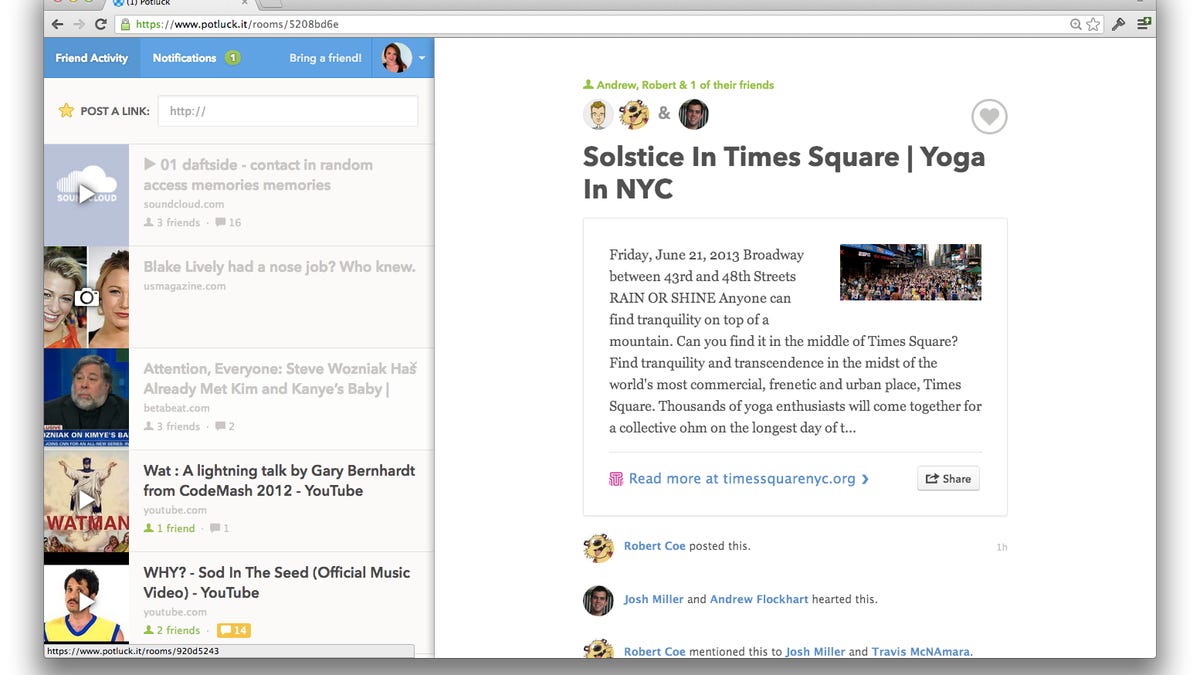Potluck takes the stigma out of talking to strangers online
The app turns the old act of chatting with strangers on the Internet into something new and much more inviting.

Josh Miller is hosting a house party for the Internet and everyone is invited. The party, called Potluck, starts now and its purpose is to introduce today's generation of social networkers to people beyond their immediate friend circles.
"Most people ... have always known the Internet as a place where you only connect with people you know," Miller told CNET. "So how do we encourage them to connect with new people?"
The answer is Potluck, a social application for meeting strangers in a non-threatening environment. Actually, though, it's just a fun place to hang out and chat with friends of friends, just as you would at a social gathering -- say a potluck. The potential new connections are just an added bonus.
Potluck is the product of Branch, a young startup backed by Twitter's inventors that is focused on improving Internet conversations. Potluck essentially consists of the simplest bits of the company's initial conversation tool, but everything here has been packaged in a way that will appeal to the average Internet user, not just those comfortable with publishing on the Web. It's a forum that doesn't look like one; a chat room without the creep factor.
The social application, launching on the Web on Tuesday, uses the link, a catchall Internet entity, to get the party started. With this structure, Potluck cooks up a clever recipe for natural interaction. You bring your favorite links to share. I'll bring mine. We all find something we like.
Once inside the party, you'll find a feed of all the links that your friends have posted, commented on, or liked ("hearted" in Potluck parlance), which means you're immediately exposed to the tastes of those beyond your immediate circle. Click on the links that strike your fancy and you'll find yourself inside a type of chat room where you can view a preview of the shared content, see who else has shown interest in the link, leave comments, heart other people's comments, and mention friends to bring them into the threads. And notifications ensure that you stay privy to all developing conversations and connections.
Links are the red herring that will get a group of strangers to talk to each other, Miller said.
The potluck approach seems to work here just as well as it does in real life. People who sign up first find their friends from other social networks, which means they are coming to the party with a group of folks they already know. The structure intentionally takes the weird factor out of using the Internet to meet people with similar interests and hobbies. You're meeting strangers on the Internet, but in a semi-private way where mutual friends play accidental matchmakers.
"We've seen over and over again that organically people are connecting with [people] that they didn't know before," Miller said of Potluck's early start. "It's something that doesn't happen very much on the Internet anymore."
Potluck already has 1,000 users who have found their way to the pre-launch app through word of mouth. Though launching first as a Web service, the app was specifically designed for smartphone users and will arrive on iOS in a few weeks. Really, the Web site is just a testing ground for the coming-soon iOS experience, Miller said.
With a fresh twist on what it means to be social and a new take on the friend network, Potluck has all the ingredients to become a quick hit -- at least once that promised mobile application arrives. Miller and co. seem to think they've got something special on their hands, and the majority of Branch's eight person staff has shifted their attention to work on Potluck.
Earlier this year, Miller posited that for a company to become the next Facebook, it would need to enable a novel network of people, not just another copy of a person's address book. Now that he's done just that with Potluck, he's not anticipating Facebook-level greatness right away, but he does hope to play host to an Internet party worth telling your friends about.

